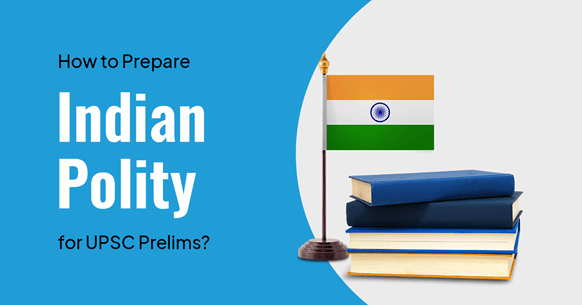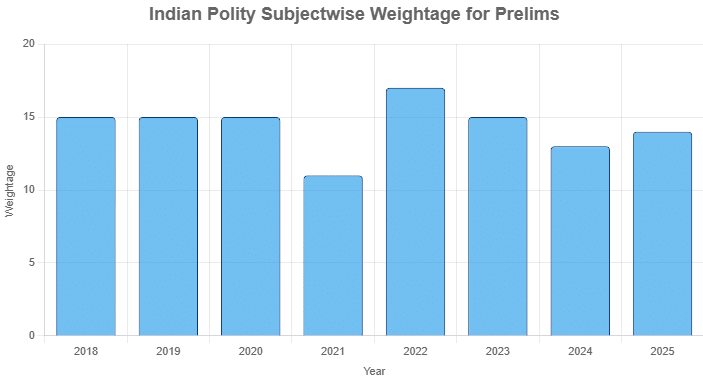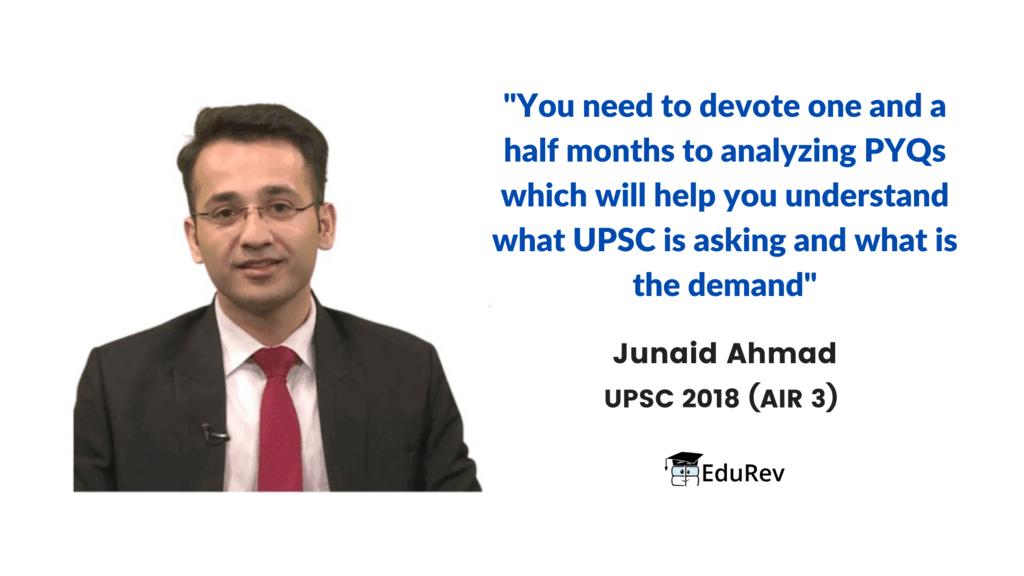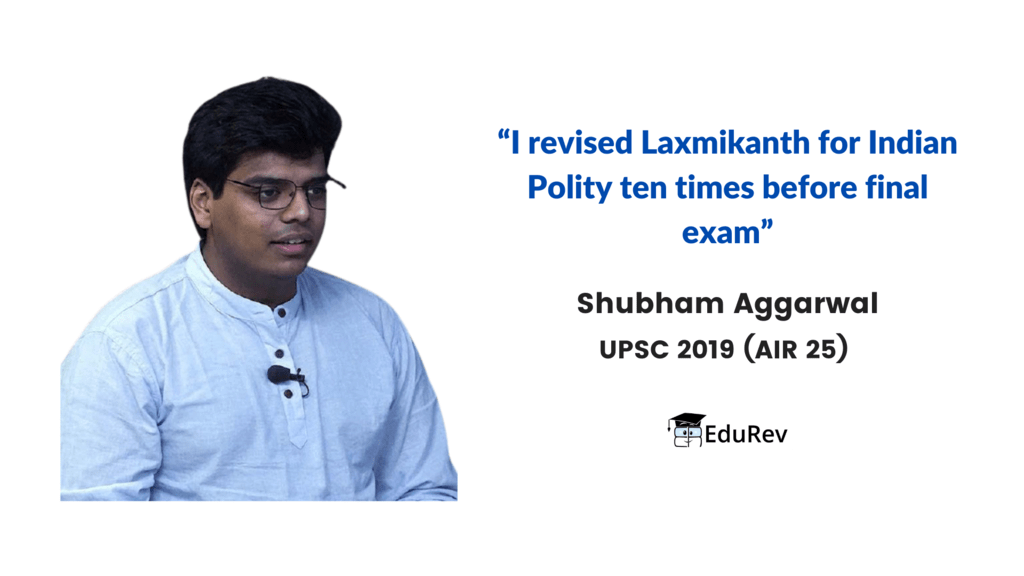Syllabus & Strategy to study Indian Polity for UPSC CSE | Indian Polity for UPSC CSE PDF Download
Indian Polity is one of the most important subjects for the UPSC Civil Services Exam. Questions directly related to the constitutional framework have been asked in all three stages of the Civil Services examination.
Apart from mastering the Indian Constitution, being well aware of the basics of our political functioning is quintessential for the candidates who strive to compete in the civil services exam. Even when one gets into the service, the significance of the subject is carried forward.
Importance of Polity as a subject in UPSC
Polity & Governance as a module in General Studies has at least 20 - 25% weightage is given in prelims and 40% weightage in GS PAPER 2 in mains examination. You need to prepare this topic properly as such weightage gives a good chance for your selection in the exam.

Important & High-Yield Topics in Polity for UPSC Prelims & Mains
Based on a detailed review of past year UPSC papers, the following areas within Indian Polity have shown consistent recurrence and should be prioritized in preparation:
- Constitutional Framework (Preamble, Schedules, Sources, Salient Features)
- System of Government (Parliamentary vs Presidential, Federalism, Emergency Provisions)
- Central Government (President, Prime Minister, Council of Ministers, Parliament)
- Governance and Political Dynamics (Amendments, Political Parties, Pressure Groups, Recent Bills & Acts)
How to Prepare for Indian Polity
The experts of EduRev, who've mentored thousands of students, including Anudeep Durishetty AIR , Monica Kishore AIR 41 , Swati Sharma AIR 18 & others, have compiled the syllabus & strategy for Polity to help you prepare smartly for the exam, by providing you with the right guidance and relevant information. Our objective is to ensure that you should study what actually matters in the exam.
Step 1: Understand the Syllabus of Polity
The Indian polity and governance syllabus for IAS prelims is very precise. But, it encompasses a lot of important concepts and issues to understand. The UPSC Polity syllabus in IAS Prelims is as follows:
Indian Polity and Governance: Constitution; Political System; Panchayati Raj; Public Policy; Rights Issues Indian Polity encapsulates the entire constitutional framework and how our political system works.
EduRev's team has broken down the Indian Polity topics mentioned in the UPSC notification into smaller sub-topics that will ease your preparation further.
- Preamble: Features of preamble, 42nd Amendment, Swaran Singh committee, Berubari Case, Keshavnanda Bharti Case, LIC Case.
- Schedules: Basic idea about 12 schedules
- Constitution of India: Basic idea about All articles, Historical Background, Drafting committee and the making of the Constitution, Influence of other constitutions, Its salient features, Union and its Territory, Basic idea about Article 1-4, State reorganization and different Commissions, Federal nature, Recent issues
- Citizenship: Basic idea about Article 5-11, PIO, NRI, OCI, and Pravasi Bharathiya Divas, Privileges available for Indian citizens and foreigners, Citizenship Amendment Act of 2016, New policies, schemes, and recent changes in voting.
- Fundamental Rights (FR): Basic idea about Article 12-35, A thorough understanding of Articles 14- 30 and Article 32, Rights and privileges available to citizens of India only to the citizens and both to citizens and foreigners, 44th amendment act, Different types of Writs, Enforcement and Exceptional cases with regard to FR’s, RTE and recent issues related to FR
- Fundamental Duties(FD): Article 51A, Difference between FR and FD, Significance and Criticism, Enforcement of FD’s, Recent issues about FD
- Directive Principles of State Policy (DPSP): Basic idea about Article and Article 36-51 and Article 368, Sources and key features of DPSP, Classification of DPSP, Comparison/ conflicts between Fundamental Rights and Directive Principles, Keshavananda Bharathi, Minerva Mills, Golaknath Case, Maneka Gandhi case., Important Amendments – 42nd Amendment, 44th Amendment, and 97th amendment
- Union: Basic idea about Article 52-73, Qualification and Election, Function and Powers- (Executive, Legislative, Financial, Judicial, Diplomatic, Military and Emergency Powers), Resignation and impeachment, Role and responsibilities and relationship with Prime minister, Council of Minister, Cabinet ministers., Prime minister and council of ministers- A basic idea about Article 74-75, Powers and Functions, Resignation and Removal, Attorney general
- Parliament: Basic idea about Articles: 79-88/122 related, Role and functions of the Parliament, Sessions, Motions, Parliamentary procedure – Summoning, Prorogation, Joint sitting, Parliamentary proceedings like Question Hour, Zero Hour, and Adjournment Motion, etc., Lok Sabha and Rajya Sabha,, Special powers of Rajya Sabha, Anti-defection law and 10th schedule, Parliamentary Privileges, Bill and lawmaking procedure, Budget, funds, and its summary, Parliamentary Committees
- Judiciary: Basic idea about Articles 124 to 147 related to the judiciary., Powers of Supreme court and high court, Qualification and appointment, Removal procedure, Recent controversy, verdicts, and constitutional provisions.
- State Government- State Executive (Articles 153-167) : Governor- appointment, removal and special powers, Executive, Legislative, Financial, Judicial powers and discretionary of the governor, 7th constitutional amendment, Chief minister and council of ministers, Power of chief minister
- State Legislature(Articles 168-177): State legislature compared to the Parliament with regard to composition, powers, and functions., Bicameral legislatures, Creation and abolition of the Legislative councils
- Administration of Union Territories (UT): Special provision for Delhi, Administration and jurisdiction in UT’s
- Administration of Special Areas: Basic idea about 5th Schedule 6th Schedule, Recent issues related to Administration of Special Areas, Special provision for Jammu and Kashmir-Article 370, Difference between constitutional provisions related to Jammu and Kashmir
- Emergency Provisions: National emergency- Article 352, President’s rule or State emergency- Article 356, Financial emergency- Article 360, 44th Amendment Act, Effects and implications of emergency, Role of President in emergency time, The State of FR, Lok Sabha, and Rajya Sabha, Revoking emergency
- State-Centre and interstate relations: Basic idea about Articles 262 and 263, Composition and functions of Interstate council and Zonal council, Inter-State trade and Commerce, Recent disputes between states, controversies etc, New policies or schemes which impact interstate relations
- Panchayati Raj and municipalities: Elections, auditing, powers and authority of panchayats, 3 tier structure, 73rd Amendment Act and 74th Amendment Act, Relation with FR and DPSP, Schemes introduced, Metropolitan planning committee and urban development, Reservation
- Constitution Bodies: Election Commission, UPSC, SPSC, JPSC, Finance Commission, National Commission for SCs and ST’s, Composition, Powers and Functions, Removal of the Constitutional bodies
- Non-Constitutional Bodies: Basic idea about Composition, Functions, Working of the Non-Constitutional bodies such as National Human Rights Commission, Central Information Commission, Central Vigilance Commission, Central Bureau of Investigation, State Human Rights Commission, State Information Commission etc
- Tribunals: Basic idea about Article 323A and tribunals under Article 323B, Recent controversial issues related to tribunals, Different tribunals and the importance
- Special Provisions for SC’s, ST’s, Backward Classes, Minorities and Anglo-Indians: Privileges and rights issued to SC’s, ST’s, Backward Classes, Minorities, and Anglo-Indians, Issues related to vulnerable sections like women, children, SC’s, ST’s, Backward Classes, Minorities, and Anglo-Indians
- Current Affairs: Recent issues related to the above-mentioned categories, Important schemes, programs, missions, laws, and policies launched by the government, Recent Government Bills and Governance- actions.
You can find video lectures, detailed notes & tests for all the following topics in the Polity Course on EduRev.
Step 2: Analyze Previous Year Questions (PYQs)

Once you’re through the syllabus, pick up the previous year's papers and skim through them to get an understanding of what is actually asked in the exam.
- Look for the source that gives topic-wise questions of previous years. So that you can have a complete understanding of each topic and the type of questions asked.
- You can get the last 10-years of UPSC Prelims & Mains papers from here - UPSC Previous Year Question Papers
- You can also refer to the topic-wise questions of Indian Polity from the last 25-years here.
Step 3: Build your Foundation: NCERTs
- NCERT Books: Read NCERT books thoroughly to build your foundation
- Class XI NCERT textbook – Indian Constitution at work: Indian Constitution at Work
- Class XI NCERT textbook – Political Theory: Political Theory
- If you’ve ample time, you should read all the NCERTs from Class 6 to Class 12.
- NCERT based tests: Attempt NCERT based tests to test your learnings and strengthen your foundation.
- Read NCERT summaries: In case you've already read the NCERTs, we recommend you to go through NCERT summaries for a quick revision.
Step 4: Read Important Reference Books: M. Laxmikanth & Others

- Thoroughly go through the basic book for Indian Polity for M. Laxmikanth. This is the only book required to prepare polity perfectly. Go read and revise it again and again and practice tests. Summaries & MCQ tests on M. Laxmikanth are available here.
- IAS aspirants should read Indian Polity by Laxmikanth from cover to cover at least once before they start in-depth preparation. It is a good idea to make Indian Polity notes from the book for the UPSC exam and keep them handy for revision.
- Introduction to the Constitution of India by D.D. Basu can be extremely useful for mains and gives a candidate an in-depth analysis of the subject. Beginners will find the language of this book quite complex and do not go for it for prelims.
Step 5: Perfect Your Concepts through Video Lectures & Detailed Notes
- Once you've studied all the mentioned books, you should refer to any one source of notes & video lectures which will help you to strengthen the concepts and understand the same topic from a different perspective.
- This will give you a fair idea about the type of questions being asked in recent years. It will also help you in revising effectively and efficiently.
- Regular revisions from notes and video lectures can help strengthen the basics and boost one’s confidence in the subject. You get topic-wise compiled notes & video lectures in the Indian Polity course on EduRev, available on this link.
- Solving previous year prelims question papers can aid a candidate in understanding the nature of questions and prepare accordingly.
Step 6: Attempt Topicwise Tests
- MCQ Tests on all the topics (& sub-topics) of polity subjects are helpful for clear understanding, proper practice, and quick revision.
- These tests will help you in self-evaluation and you can check, whether you've understood a topic completely or not.
- You can get topic-wise tests in the Indian Polity course on EduRev, available on this link.
- You can get previous year papers of UPSC Prelims & Mains here.
- You can get questions from last 25-years of UPSC prelims are arranged topic-wise here.
Step 7: Focus on Newspapers & Current Affairs
- Pay attention to news and editorials related to the Indian constitution, National and International Political systems.
- It is a wise idea to read newspapers daily as many questions are asked from the recently announced schemes.
- All new bills, acts, policies and any related provisions should be noted down.
- Newspapers such as “The Hindu” and “The Indian Express” are excellent sources of knowledge.
- Follow the Current Affairs & Hindu Analysis: Daily, Weekly & Monthly course on EduRev. You also get monthly news compiled for all the topics Polity here.
Step 8: Improve Your Understanding by Answer Writing
- As the pattern of the paper is evolving the candidate's horizontal expansion of the knowledge as well as the vertical limit of understanding of the topic is expected in a balanced proportion.
- There are a number of political events happening around the year and the candidates have to take a close watch on the current political scenario and the pending bills in the Parliament and recommend monthly current affairs for better understanding on the same.
- The candidates should keep a tab on the currently passed Acts and also on the pending Acts in the Parliament.
- EduRev’s course on Essays provides you with sample essays to help you understand the pattern of essays.
Step 9: Grasp the Concepts of Indian Constitution
The Constitution is the bible of civil service aspirants. The ways to understand the Indian Consitution are stated below:
- Read the articles thoroughly. This will help you to build a basic understanding of each Article.
- Repeated reading is necessary for this process. The more times you read the more you would remember.
- Prepare a short note with highlighted keywords and relate them to a current issue in a pragmatic way.
- The aim should be abstracting the relevant information according to UPSC syllabus the essence, not to mastery over a topic.
- You can find the Original Text of Indian Constitution here
Step 10: Attempt Mock Tests of Polity
- Polity questions in prelims can get tricky as in the first look of it, all options look similar and this may lead to confusion and ambiguity. In order to be easy with the subject solve lots of mock tests.
- Consider your preparation incomplete if you haven’t solved a Mock Test.
- To effectively prepare and score more in Indian Polity, you should schedule at least 2 mock tests per week in the initial stages of preparation, and 1 mock test per day when the exam approaches closer.
- You can get subject-wise mock tests and complete mock tests in the UPSC CSE Prelims Mock Test Series for UPSC.
- It is recommended to attempt multiple mock tests from different sources, online platforms & coaching centers.
EduRev has provided all the study material & tests which matters in your preparation for UPSC, compiled under multiple courses. You can refer to this document “How to study Polity using the EduRev App? ” to understand it better & ace the exam smartly.
Other Important Links
1. Overall Understanding of Exam:
Check out these documents and prepare your strategy for UPSC-CSE accordingly.
- UPSC Syllabus for Prelims & Mains Exam
- How to prepare for UPSC Civil Services Examination?
- How to study NCERTs for UPSC Preparation with EduRev App?
- How to Study Current Affairs for UPSC Preparation with EduRev App?
2. Check out Subject- Wise Syllabus, Booklist & Strategy:
- Syllabus, Booklist & Strategy to study Geography for UPSC - CSE Prelims
- Syllabus, Booklist & Strategy to study History for UPSC - CSE Prelims
- Syllabus, Booklist & Strategy to study Indian Economy for UPSC - CSE Prelims
- Syllabus, Booklist & Strategy to study Environment for UPSC-CSE Prelims
- Syllabus, Booklist & Strategy to study Science & Technology for UPSC-CSE Prelims
Happy Learning with EduRev!
|
142 videos|779 docs|202 tests
|
FAQs on Syllabus & Strategy to study Indian Polity for UPSC CSE - Indian Polity for UPSC CSE
| 1. Why is Indian Polity important for the UPSC exam? |  |
| 2. What are the key topics to focus on while studying Indian Polity for UPSC? |  |
| 3. How can I effectively analyze Previous Year Questions (PYQs) for Indian Polity? |  |
| 4. Which NCERT books are recommended for building a foundation in Indian Polity? |  |
| 5. How can current affairs be integrated into the study of Indian Polity for the UPSC exam? |  |






















